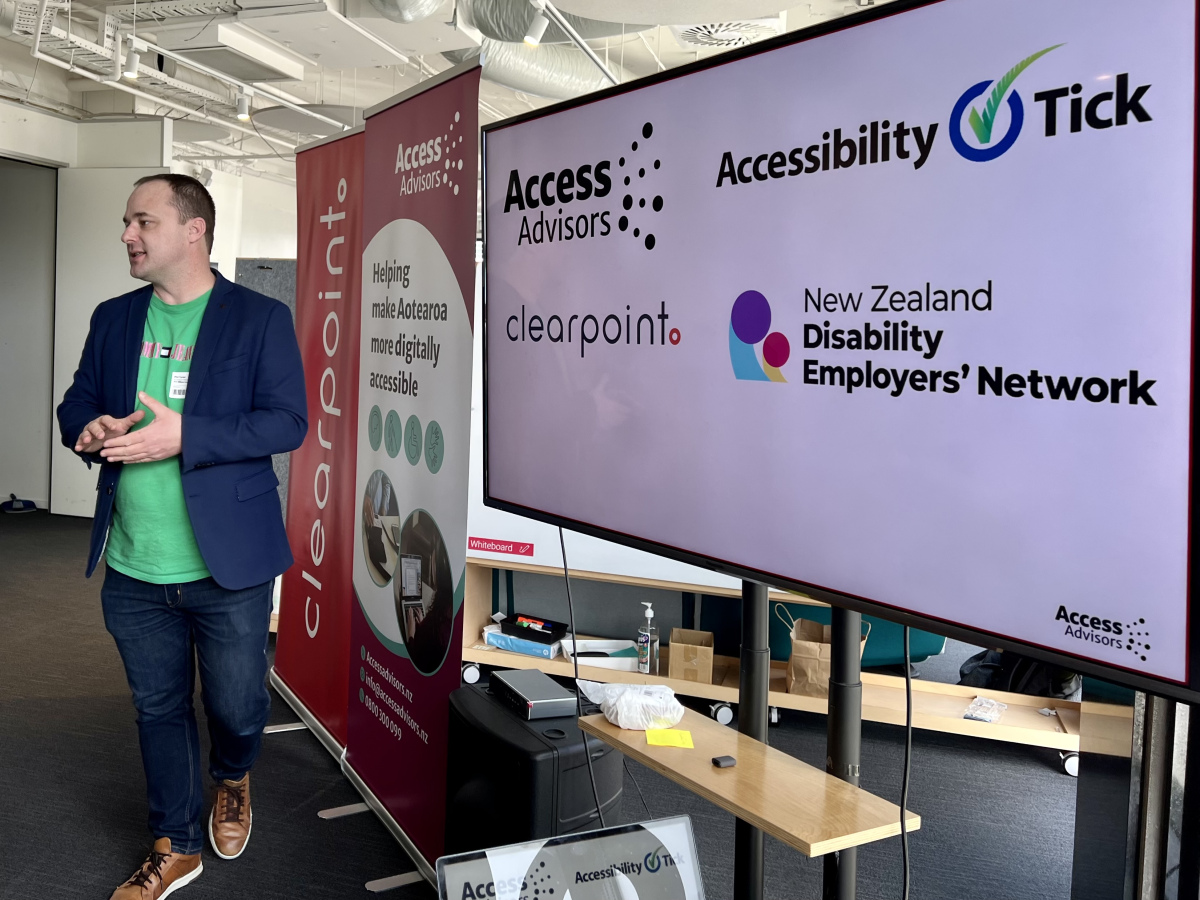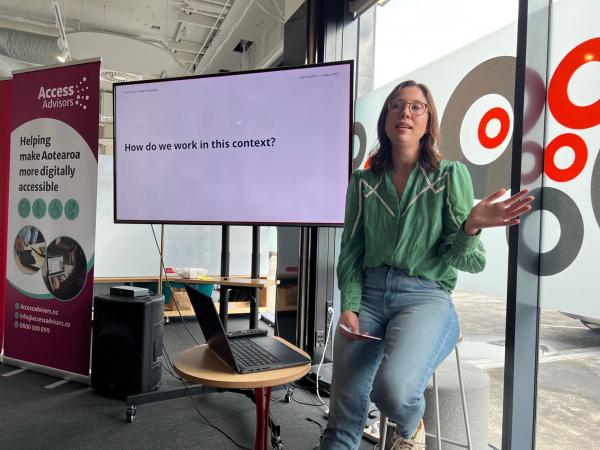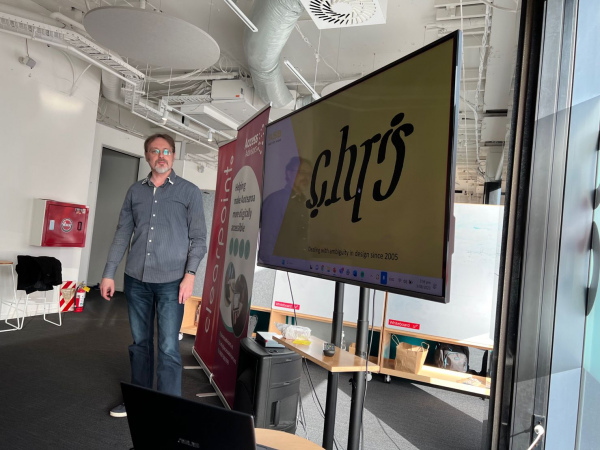Business Case for Digital Accessibility Workshop
The recent Business Case for Digital Accessibility workshop attracted some amazing speakers, had a fabulous audience and resulted in some takeaways.

In a world where technology seamlessly intertwines with our daily lives, the concept of digital accessibility still seems to be under-represented. It is important to understand the ‘Business Case for Digital Accessibility’ to be able to sell the concept to organisations. To help with this conversation Access Advisors, the Accessibility Tick and the New Zealand Disability Employers Network teamed up for an event to discuss the 'Business Case for Digital Accessibility.' This was a pre-conference event for the annual Disability Inclusive Pathways Conference.
This fabulous pre-conference workshop in early August was entitled 'Supporting the Business case for Digital Accessibility.' Feedback has been fabulous and we had amazing speakers and great participation from the attendees who came from a variety of corporate and support organisations. It certainly indicates an interest in digital accessibility.
Speakers included Laila Coulton from Xero, Gillian McCarthy from Victoria University Wellington, Callum McMenamin from Department of Internal Affairs, Lauren Hayes an independent arts and accessibility consultant and Chris Anderson from ASB. The session was facilitated by yours truly, Chandra Harrison from Access Advisors.

We covered a lot of ground in an afternoon of korero. We will make the videos available as soon as they are properly captioned. Many of the key themes will also make individual posts. In the meantime, there are several key take away messages that we'd like to share.
1. Provide feedback to businesses
The most important takeaway from the workshop for me was a resounding message that the power to effect change lies not only with organisations, but also with individual users. There was a clear call for disabled people to report digital accessibility challenges actively and respectfully to organisations. Many companies will respond if they know and understand the issues.
Companies can go beyond and be proactive, providing a clear and dedicated communication channel to support people with access needs. This approach fosters collaboration between users and businesses, emphasising that their voices are heard and valued, and forging a relationship that drives positive change.
If you find an access issue on a website do not hesitate to send the company responsible an email. Explain who you are, what your access needs are, what the issue is and why it is a problem.
2. Celebrate digital accessibility success stories
During the workshop it became clear that Aotearoa New Zealand lags behind our neighbours on digital accessibility. But the speakers provided some fairly robust indications that things are moving in the right direction. Successful digital accessibility programmes in large organisations and Government demonstrate the move towards a more digitally accessible Aotearoa New Zealand.
The workshop highlighted the importance of drawing inspiration from these triumphs as we collectively work towards a more accessible digital environment. These success stories show that it is possible to make things better, and they give us hope for the future. We should celebrate and learn from these examples. Maybe we could even hold a conference focused on digital accessibility.
If you have a success story turn it into a blog and share the celebration.
3. Use the carrot of business benefits
Another clear theme that emerged from the workshop was that it’s often better to use a carrot rather than a stick to convince stakeholders to invest in improving digital accessibility. We heard several examples highlighting the benefits of using business benefits as a carrot, rather than waving the stick of risk and litigation. Laila Coulton talked about how in a previous role where she used the stick, her efforts were rejected.
In today's dynamic business landscape, the path to success is illuminated by collaboration and innovation. Several of our speakers mentioned that the "carrot" approach is much better when it comes to digital accessibility. While we all know that making websites and apps accessible is the right thing to do, its also about selling how it is better for businesses. When websites and apps are easy for everyone to use, more people can enjoy them. This can help businesses grow and become even better. It's a win-win situation for everyone.
The workshop reframed the narrative around digital accessibility by spotlighting its role as a strategic advantage for businesses. Rather than merely complying with accessibility guidelines, organisations can recognise the undeniable link between inclusivity and business growth. A truly accessible digital presence translates to broader market reach, increased customer loyalty, and enhanced brand value. Especially in today's economically challenging times, embracing digital accessibility isn't a burden – it's an opportunity to leverage innovation and drive sustainable growth.
If you want to sell the business case of digital accessibility, then clearly articulate the specific business benefits.
4. Include digital accessibility in education
It also emerged was that New Zealand does not have sufficient coverage of digital accessibility in our curriculum. While there is a micro-credential offered by Victoria University Wellington, most schools and universities fail to provide clear instruction about digital accessibility in any courses. For us to continue to make progress, schools and universities should teach about improving digital accessibility.
While the digital landscape evolves at an unprecedented pace, education remains a critical foundation for fostering inclusivity. By equipping the leaders of tomorrow with a comprehensive understanding of access needs, assistive technology, and user-centric design, we will ensure that the principles of accessibility are woven into the fabric of every digital endeavour.
Digital accessibility should be an integral part of every school and university curriculum. By equipping students with an understanding of access needs, assistive technology, and designing user-friendly digital interfaces, we pave the way for a more accessible and equitable digital world. This shift is more than pedagogy; it's a commitment to empowering future generations with the tools to create a truly inclusive digital world.
If you are in education, consider including information about digital access needs.
5. Realise that change takes time to implement
Another key concept that was highlighted for me was that even though there are success stories, change often takes time for large organisations. Incorporating digital accessibility into business process isn’t something that can happen overnight. Legacy processes and technology can slow things down. Even if people do let organisations know that there are problems, they have to make their way through all the layers of the business.
One way to address this is that some organisations keep in touch with their clients. If disabled people complain, companies can let them know what is happening, and when. Companies need to also find ways to help people achieve their goals before the organisation can actually fix the wider problem.
If you are an organisation who does want to make a difference then communication with people with access needs is key, and a dedicated communication channel plus an accessibility statement can help.
6. Progress requires us all to think of digital accessibility
The overarching takeaway is that it's all about teamwork. We can make a difference by speaking up, learning from success stories, understanding the business benefits, and teaching accessibility to the next generation. When we work together with businesses, we take steps toward a digital world where everyone can participate, learn, and have fun without any barriers.
The path to digital accessibility seems to be paved with collaboration. From amplifying user voices to celebrating success stories and embracing accessibility as a strategic advantage, every step forward is a collective effort. The workshop's key takeaways underscore the importance of shared responsibility, where businesses, individuals, and educational institutions work hand in hand to build an inclusive digital future.
Remember that it is everyone’s responsibility to communicate the problems and get them fixed.
In summary, 'Business Case for Digital Accessibility' workshop highlighted that there is progress being made and there is hope that we can create a digital world where everyone is included. By providing feedback directly to businesses with access issues, celebrating and getting inspired by success stories, communicating how accessibility helps businesses and including digital accessibility in the curriculum, we're on a journey toward a fairer and more inclusive digital future.
If you’d like to learn more about the business case for digital accessibility or our services, get in touch with us.


